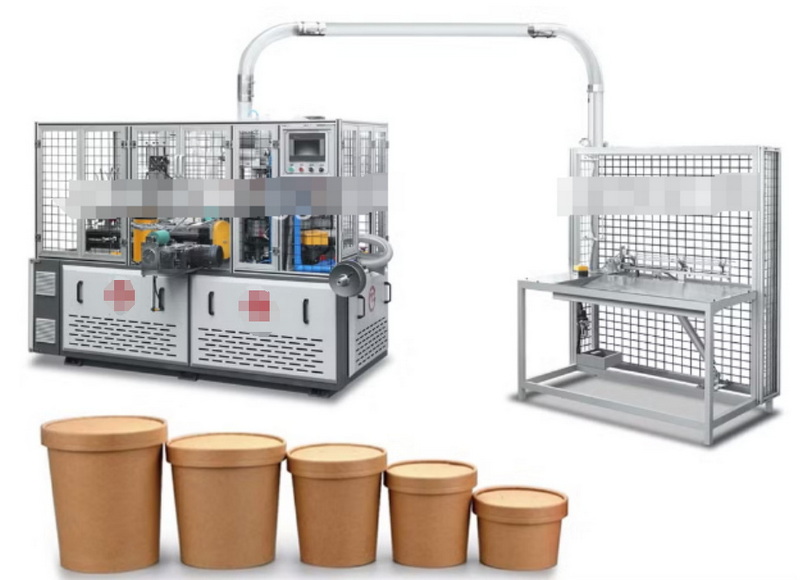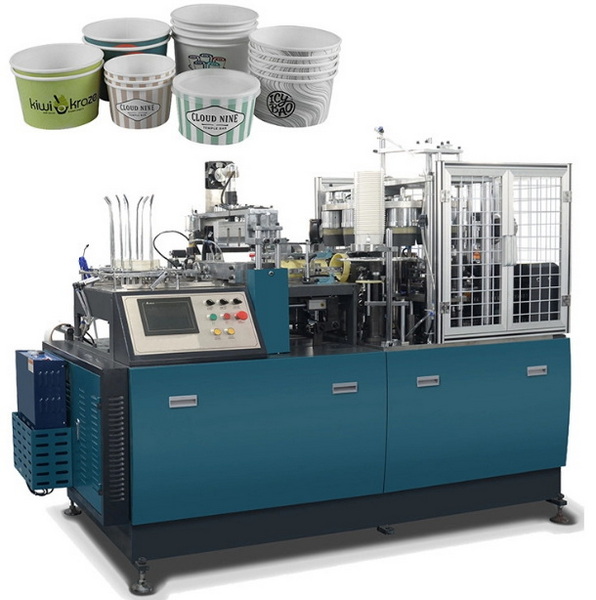
Content Menu
● Understanding Disposable Cup Plate Making Machines
>> Types of Machines
● Key Factors Affecting Maintenance Costs
>> 1. Machine Complexity and Automation Level
>> 2. Build Quality and Materials
>> 3. Production Volume and Usage Intensity
>> 4. Spare Parts Availability
>> 5. Manufacturer Support and Warranty
● Maintenance Cost Breakdown
>> Routine Maintenance
>> Replacement of Wear Parts
>> Labor Costs
>> Downtime and Lost Production
● The Link Between Maintenance and Disposable Cup Plate Making Machine Price
● Strategies to Minimize Maintenance Costs
>> 1. Invest in Quality Equipment
>> 2. Implement Preventive Maintenance Schedules
>> 3. Train Operators Thoroughly
>> 4. Keep Essential Spare Parts in Stock
>> 5. Utilize Manufacturer Support
● The Role of Automation and Technology
● Long-Term Value: Balancing Price and Maintenance
● Additional Considerations for Maintenance
>> Environmental Factors
>> Operator Experience
>> Upgrades and Retrofits
● Conclusion
● FAQ
>> 1. What factors influence the maintenance cost of a disposable cup plate making machine?
>> 2. How does the disposable cup plate making machine price relate to maintenance costs?
>> 3. What are common maintenance tasks for cup plate making machines?
>> 4. Can automation help reduce maintenance costs?
>> 5. What should businesses look for when choosing a machine to minimize maintenance costs?
The rapid expansion of the food service industry and the increasing demand for convenient, single-use tableware have made disposable cup and plate production a lucrative business opportunity worldwide. Whether you are a new entrepreneur or an established manufacturer, understanding the maintenance cost of cup plate making machines is essential for maximizing profitability and ensuring smooth, uninterrupted production. This comprehensive guide explores every aspect of maintenance costs, their relationship with the disposable cup plate making machine price, and actionable strategies to reduce long-term expenses.

Understanding Disposable Cup Plate Making Machines
Disposable cup plate making machines are specialized industrial devices designed to manufacture cups and plates from materials such as paper, plastic, or biodegradable compounds. These machines are available in a range of configurations, from basic manual and semi-automatic models to sophisticated, fully automated systems. The disposable cup plate making machine price varies widely, depending on production capacity, automation level, material compatibility, and brand reputation.
Types of Machines
- Manual Machines: Operated by hand, suitable for small-scale or startup operations.
- Semi-Automatic Machines: Combine manual feeding with automated forming and cutting, offering a balance between cost and efficiency.
- Fully Automatic Machines: Handle the entire process, from raw material feeding to finished product stacking, ideal for high-volume production.
Each type comes with unique maintenance requirements, which directly influence the total cost of ownership.
Key Factors Affecting Maintenance Costs
1. Machine Complexity and Automation Level
The complexity of a cup plate making machine is a major determinant of its maintenance needs. Manual and semi-automatic machines have simpler mechanisms, making them easier and cheaper to maintain. Fully automatic machines, while boosting productivity, often require specialized knowledge for servicing and troubleshooting, which can increase maintenance costs.
2. Build Quality and Materials
Machines constructed from high-grade steel and durable components tend to withstand wear and tear better. Investing in a robust machine may increase the initial disposable cup plate making machine price, but it often leads to lower maintenance expenses over the machine's lifespan.
3. Production Volume and Usage Intensity
The more a machine is used, the faster its components wear out. High-volume production lines should expect more frequent maintenance and part replacement, while lower-output operations may experience fewer issues.
4. Spare Parts Availability
Readily available spare parts are critical for minimizing downtime and controlling repair costs. Machines from established brands typically offer better spare parts support, which can make a significant difference in long-term maintenance expenses.
5. Manufacturer Support and Warranty
Comprehensive after-sales support and warranty coverage can greatly reduce maintenance costs. Manufacturers that provide detailed manuals, operator training, and responsive technical support help businesses resolve issues quickly and efficiently.
Maintenance Cost Breakdown
Routine Maintenance
Routine maintenance includes daily cleaning, lubrication of moving parts, inspection for signs of wear, and tightening of bolts and fittings. These tasks are essential for preventing breakdowns and ensuring consistent product quality. The cost of routine maintenance is generally lower for simpler machines and increases with the complexity of the equipment.
Replacement of Wear Parts
Certain components, such as cutting blades, heating elements, belts, and bearings, are subject to regular wear and must be replaced periodically. The frequency of replacement depends on production intensity, material type, and the quality of the parts used.
Labor Costs
Maintenance labor costs depend on the skill level required for servicing the machine. Simpler machines can often be maintained by in-house operators after basic training, while advanced machines may require specialized technicians, increasing labor expenses.
Downtime and Lost Production
Unexpected machine failures can halt production, leading to lost revenue and missed deadlines. Preventive maintenance and prompt repairs are essential for minimizing these costly interruptions.

The Link Between Maintenance and Disposable Cup Plate Making Machine Price
When evaluating the disposable cup plate making machine price, it is important to look beyond the initial purchase cost. Machines with lower upfront prices may seem attractive, but they can incur higher maintenance costs due to inferior materials, limited spare parts, or lack of manufacturer support. Conversely, investing in a higher-priced machine from a reputable manufacturer often results in lower maintenance frequency, reduced downtime, and better long-term value.
Strategies to Minimize Maintenance Costs
1. Invest in Quality Equipment
Choose machines with a proven track record of durability and reliability. While the disposable cup plate making machine price may be higher, the reduction in maintenance costs and downtime can lead to greater profitability over time.
2. Implement Preventive Maintenance Schedules
Establish a regular schedule for cleaning, inspection, lubrication, and part replacement. Preventive maintenance helps catch issues early, reducing the risk of major breakdowns and expensive repairs.
3. Train Operators Thoroughly
Properly trained operators are less likely to misuse equipment, reducing the risk of damage and unnecessary repairs. Training should cover daily maintenance, troubleshooting, and safe operation procedures.
4. Keep Essential Spare Parts in Stock
Maintaining an inventory of critical spare parts ensures that minor repairs can be completed quickly, minimizing downtime and avoiding the higher costs associated with emergency part shipments.
5. Utilize Manufacturer Support
Take advantage of manufacturer-provided resources such as technical manuals, online support, and on-site training. Some suppliers include extended warranties or maintenance contracts in the disposable cup plate making machine price, offering further cost control.
The Role of Automation and Technology
Modern cup plate making machines often feature advanced automation, smart sensors, and user-friendly interfaces. These technologies not only increase production efficiency but also simplify maintenance by providing real-time diagnostics, automated alerts for routine servicing, and remote troubleshooting capabilities. While such features may increase the initial disposable cup plate making machine price, they often result in lower long-term maintenance costs and improved machine uptime.
Long-Term Value: Balancing Price and Maintenance
When considering the disposable cup plate making machine price, businesses should adopt a holistic approach that weighs both initial investment and ongoing maintenance costs. A machine with a higher purchase price but superior reliability and lower maintenance needs can deliver greater value and profitability over its operational life.
Additional Considerations for Maintenance
Environmental Factors
The working environment can significantly impact machine maintenance needs. Dust, humidity, and temperature fluctuations can accelerate wear and cause electrical or mechanical issues. Ensuring a clean, climate-controlled production area helps extend machine life and reduce maintenance costs.
Operator Experience
Experienced operators are more adept at identifying early warning signs of machine trouble, allowing for timely intervention and reduced repair costs. Investing in continuous training and skill development pays off in lower maintenance expenses.
Upgrades and Retrofits
Over time, manufacturers may offer upgrades or retrofits to improve machine performance or address common maintenance issues. Staying informed about available updates can help reduce maintenance costs and extend the useful life of your equipment.
Conclusion
The maintenance cost of cup plate making machines is a critical factor in the overall economics of disposable cup and plate production. While the disposable cup plate making machine price is a major consideration, long-term success depends on selecting equipment that balances affordability, durability, and ease of maintenance. By investing in quality machines, implementing preventive maintenance practices, and leveraging manufacturer support, businesses can minimize operational costs, maximize uptime, and achieve sustainable growth in the competitive disposable tableware market.

FAQ
1. What factors influence the maintenance cost of a disposable cup plate making machine?
The main factors include machine complexity, build quality, frequency of use, availability of spare parts, and the level of manufacturer support. Machines with advanced automation or from reputable brands may have higher upfront costs but typically offer lower maintenance expenses over time.
2. How does the disposable cup plate making machine price relate to maintenance costs?
A lower-priced machine may result in higher maintenance costs due to inferior components or lack of support, while a higher-priced, well-built machine often requires less frequent and less expensive maintenance, leading to better long-term value.
3. What are common maintenance tasks for cup plate making machines?
Routine tasks include cleaning, lubrication, inspection, and replacement of wear parts such as blades and belts. Preventive maintenance schedules help avoid costly breakdowns and ensure consistent product quality.
4. Can automation help reduce maintenance costs?
Yes, machines with advanced automation often feature diagnostic systems, automated alerts, and easier troubleshooting, which can streamline maintenance and reduce the likelihood of unexpected failures.
5. What should businesses look for when choosing a machine to minimize maintenance costs?
Key considerations include robust build quality, ease of access for servicing, strong manufacturer support, and availability of spare parts. Investing in a machine with these attributes, even at a higher disposable cup plate making machine price, can significantly reduce maintenance expenses over time.

















